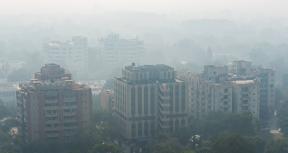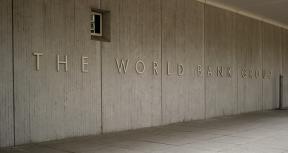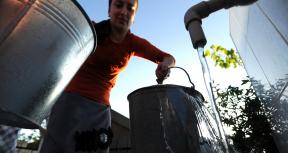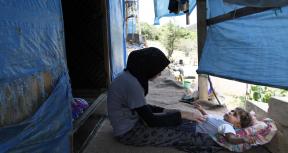How Has the World Bank Addressed Pollution Management?
To implement its strategies, the World Bank Group has used 534 projects, with a total commitment of US$43 billion, that “target” pollution management directly during FY04–17. In addition, the World Bank Group has ramped up its climate change portfolio by 300 percent over the evaluation period.
The World Bank Group supports client country governments in their efforts to create or improve the enabling environment for pollution management. Many pollution interventions attempted to prevent or treat pollution; relatively few sought to build pollution monitoring systems. Given that:
- client countries frequently struggle to identify pollution priorities; that
- pollution data are often weak; and that
- the World Bank Group’s own support is not always well targeted toward the client country’s most serious pollution priority;
the evaluation has found that this low emphasis on pollution monitoring is an important gap.
The World Bank Group made significant progress in improving pollution management in client countries:
- Urban transport interventions that sought to address air pollution were relatively successful in achieving emission reduction objectives and setting up the air quality monitoring systems, but the positive effects were mostly limited to the narrow environs around the project footprint; broader, sustained environmental benefits were achieved only in projects with comprehensive approach that included both upstream and downstream measures.
- Efforts to address pollution through solid waste management and water treatment face multiple challenges. These interventions were successful less often, depending on the ability to recover costs and institutional capacity of the municipalities in charge.
- IFC’s Advisory Services have helped client companies reduce or recycle waste, increase energy or resources efficiency, or introduce renewable energy. These services were largely successful due to the high technical quality of advice provided by IFC.
- A substantial share of IFC Advisory Services supporting wastewater or waste management facilitated the structuring of public-private partnerships. These efforts often are confronted with lack of political support for private sector participation and hence frequently fail to reach commercial closure. Similarly, IFC investments in waste and wastewater utilities are challenging investments because of governments’ frequently faltering commitment to private sector involvement.
Read more about the World Bank’s support for pollution management in Chapter 2: The World Bank Group’s Strategy and Portfolio, Chapter 3: Improving the Enabling Environment, Chapter 4: Addressing Pollution through Investments, and Chapter 5: Managing the Pollution Footprint of Projects.
The Need to Recalibrate the Approach to Fight Pollution
Over the last two decades, pollution and its effects on the poor have worsened for large parts of the world.
- From 1990 to 2013, premature mortality attributable to ambient particulate matter increased by 30 percent, from 2.2 to 2.9 million deaths per year. The number of deaths caused by ambient air pollution rose continuously in all World Bank Group client Regions, except for Europe and Central Asia.
- In 3,000 cities around the world, particulate matter levels increased by 8 percent between 2008 and 2013, particularly in low- and middle-income regions where 98 percent of cities do not meet World Health Organization guidelines on air quality.
- For indoor air pollution, despite the reductions in exposure and related death rates, the total number of deaths has mostly remained stable at about 2.9 million per year as the result of overall population growth. Waste production has increased, and waste collection and disposal has not kept pace in most countries, leading to open burning of waste and uncontrolled disposal, which in turn results in air pollution and frequent leakages of toxic effluents.
- Only water pollution shows a moderate improvement. Between 1995 and 2015, deaths from unsafe water decreased by 34 percent in low- to upper-middle income countries (from 1.9 million to just over 1.2 million) from improvements in water supply, despite the continuous decline in river water quality.
Yet the World Bank Group’s efforts dedicated to fighting local and regional pollution concerns have lost relative importance, owing to the large increase in efforts to fight climate change, which grew by 300 percent during the evaluation period.
This raises the question of whether the World Bank Group’s approach to fighting pollution needs recalibration.
See Chapter 2: The World Bank Group’s Strategy and Portfolio
Is it Time to Prioritize Pollution in Countries’ Development Agendas?
The World Bank Group is in a strong position to integrate pollution into the development agenda of client countries through policy dialogue and diagnostic work. However, country strategies rarely reflect the top pollution concerns. World Bank Group country strategies and partnership frameworks rarely reflect the most serious pollution concerns.
Only 28 percent of World Bank Group strategies for countries that have pressing pollution concerns reference such pollution concerns consistently. Most strategy documents (56 percent) do not mention them at all, even though they all had at least one major pollution concern. In particular, outdoor and indoor air pollution are rarely covered in country strategies. The recently introduced Systematic Country Diagnostic (SCD) tool captures pollution concerns more accurately. Fifty-seven percent of the SCDs identify all pollution concerns correctly.
These findings may explain why the World Bank Group overall portfolio does not reflect the most serious pollution problems. Other specific pollutants (mercury, lead, pesticides, or e-waste) have also received little attention in the World Bank Group’s portfolio. The lack of quality data on pollution, its cost, and the cost-effectiveness of pollution abatement interventions increase the difficulty of building a case for governments to undertake pollution abatement interventions or to borrow from the World Bank for that purpose.
The World Bank’s main country-level environmental diagnostic, the Country Environmental Analysis (CEA) has been instrumental in collating the pollution-relevant information and raising awareness about pollution and its costs. Yet CEAs have only covered 42 countries, due in part to limited funding, and even in these cases, pollution priorities are not reflected systematically in the World Bank’s country strategies.
Recommendations
Recommendation 1: Strengthen World Bank’s efforts, including through technical assistance and capacity and institutional building, to develop client country pollution measurement and monitoring systems, especially in countries where such capacity is low. These systems should provide quality data in a transparent and systematic manner and effectively contribute to informing policy makers and the public about pollution priorities, recognizing that efforts to build such monitoring systems are likely to require initial trust fund support, as some client countries may be unable or unwilling to borrow for such purposes.
Recommendation 2: Strengthen the World Bank’s country analytical work on pollution, in particular such analytical work that allows countries to prioritize their pollution concerns based on a country-wide and comprehensive assessment, and deploy such analytical work to cover more countries and target countries more strategically. Ensure more consistent quality of this work. This broader coverage will likely require a dedicated funding for such analytical work and involve a more strategic use of country-level analytical work that prioritizes countries with the greatest health benefits from pollution control. It will also require a more comprehensive integration of the identified pollution priorities in the SCDs and subsequent country strategies.
Recommendation 3: Intensify efforts to scale up and recalibrate the World Bank’s efforts in pollution management to address the most important pollution priorities. In doing so, the specific circumstances of the poor and their exposure to pollution should be considered, including outdoor and indoor air pollution as well as specific pollution threats (for example, lead, mercury, pesticides, chromium or e-waste) when warranted by their potential harm. Integrating pollution aspects more systematically into other sectors, for example, urban transport and energy, would be part of such an approach.
Recommendation 4: Leverage the World Bank Group’s climate change portfolio to better combat local and regional air pollution and other applicable forms of pollution. This will require designing future climate change mitigation interventions (including, for example, investments, lending, policy and ASA work and advisory services) so that they address local and regional air pollution issues.
Recommendation 5: For clients that lack the required knowledge, IFC should strengthen their support to help these clients to better comply with Performance Standards on pollution by offering advisory services. Building on the successful experience of advisory services in energy and resources efficiency, this will require offering such services to those IFC investment clients that lack the technical capacity to meet these standards.
Caroline Heider, IEG's Director-General and World Bank Sr. Vice President, addresses the United Nations Environment Assembly Leadership Dialogue about the growing threat of pollution worldwide
IEG Senior Evaluation Officer Stefan Apfalter
explains why now is the time for countries to prioritize pollution
Listen to the UNA-Canada podcast interview with
Stefan Apfalter about the evaluation:










